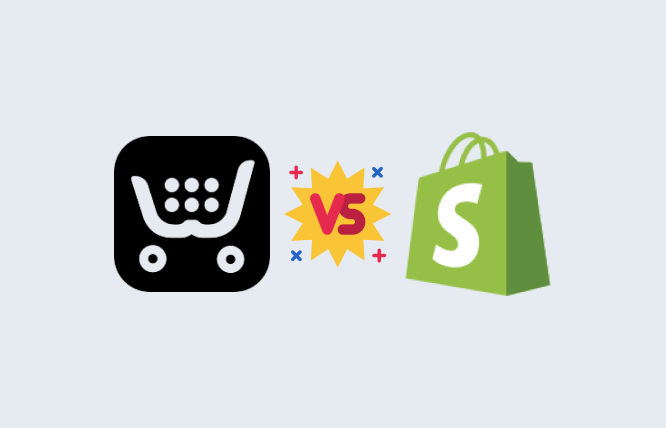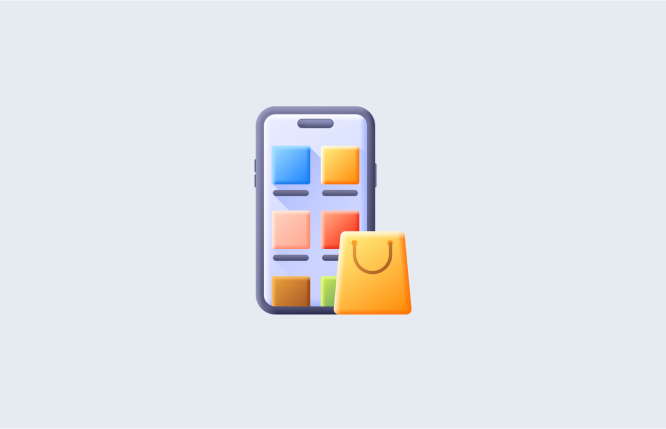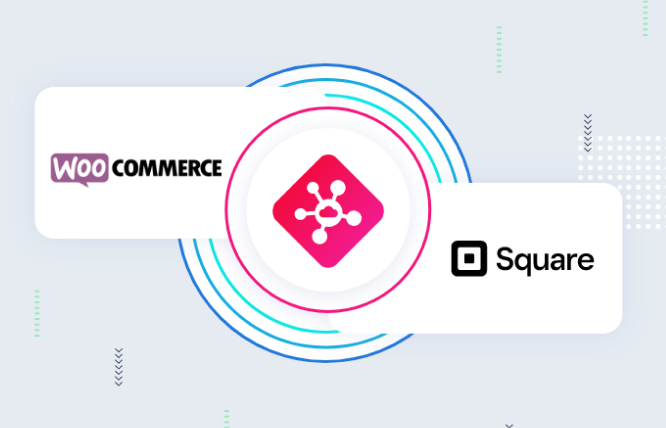Introduction
This guide compares Ecwid vs Shopify, highlighting their strengths, pricing, features, and other aspects to help you pick the perfect platform for your startup’s online success.
With 47% of all online sales happening through virtual storefronts, it’s clear the world is embracing e-commerce solutions, such as adopting e-wallets and other e-services.
Undoubtedly, these numbers will increase significantly in the coming years, highlighting the immense growth potential of the e-commerce market.
So, without further ado, let’s evaluate Ecwid vs Shopify and pick the right e-commerce platform.
These two leading contenders, Ecwid and Shopify, offer impressive features that will get you selling. But which one empowers your startup to shine? This comprehensive guide dives into a head-to-head comparison of Ecwid vs Shopify, equipping you with the knowledge to make an informed decision and watch your online store flourish.
Ecwid vs Shopify: A Head-to-Head Comparison
| Feature | Ecwid | Shopify |
| Ease of Use | Simple integration with existing websites | Build a standalone online store from scratch |
| Product Management | Freemium plans limit product count, higher tiers offer unlimited products | Unlimited products on all plans |
| Design and Customization | Limited design options, best for adapting to existing website aesthetic | Extensive theme library and customization options for a unique brand identity |
| Sales Channels | Integrates with websites, social media platforms, and marketplaces | Built-in sales channels and app store for additional integrations |
| Marketing and Promotion | Essential marketing tools like discount codes and email marketing | Built-in marketing features like SEO tools, social media integration, and abandoned cart recovery |
| Pricing | Freemium model with paid plans starting at $19/month | Paid plans starting at $29/month |
Pricing Analysis: Which Fits Your Budget?
Selecting the correct e-commerce platform depends not just on its features but also on its cost-effectiveness. Both Ecwid and Shopify provide pricing plans in different tiers to accommodate businesses of varying sizes. Let’s examine the specifics to assist you in determining which option is most suited to your Financial Plan.
Ecwid: Freemium Model with Paid Upgrades
Ecwid offers an affordable pricing model with a complimentary plan that enables you to sell up to 5 items. This is a great choice for trying out e-commerce or displaying a small product range before signing up for a paid plan. Nonetheless, the free option has restrictions on functionality and branding.
Accessing paid subscriptions grants users more functionalities and raises the restrictions on product usage. Ecwid’s monthly paid plans are much more cost-effective than Shopify’s.
Below is a detailed analysis of their pricing model:
- Venture Plan ($19/month): Ideal for startups with a small product range (up to 100 products). This Plan offers essential features like product management, discount codes, and basic analytics.
- Business Plan ($39/month): Suitable for growing businesses with a larger product catalogue (up to 2,500 products). You get features like product variations, abandoned cart recovery, and digital downloads.
- Unlimited Plan ($99/month): Perfect for established businesses with a vast product inventory. This Plan offers unlimited products and all the features Ecwid has to offer.
Shopify: Scalable Plans for Every Stage
Shopify provides pricing plans at different levels, offering more features than Ecwid’s free and lower-tier paid plans. Here is a summary of how they set their prices:
Shopify Basic ($29/month): Perfect for new businesses starting their online shop. It offers limitless products, an integrated e-commerce platform, and fundamental marketing resources. Nonetheless, a 2% transaction fee is charged when utilizing third-party payment gateways.
Shopify Standard ($79/month): Ideal for expanding companies. The standard Plan includes amenities such as recovering abandoned carts, providing gift certificates, and offering discounted transaction fees (1%).
Shopify Advanced ($299/month): Ideal for well-established businesses with a large amount of sales. This Plan offers a sophisticated report builder, carrier-calculated shipping rates, and the smallest transaction fees (0.5%).
The Key Differentiator: Transaction Fees
Although Shopify’s initial costs may appear higher than Ecwid’s, it is crucial to take into account transaction fees. Shopify does not charge these fees when you utilize their in-house payment gateway, Shopify Payments. This could potentially reduce costs for companies that conduct large numbers of transactions using Shopify.
Making the Right Choice
The optimal pricing choice is determined by your individual requirements and financial situation. Here are a few tips to assist you in making a decision:
- Limited Budget: Ecwid’s free Plan or Venture plan is a great starting point.
- Growing Business: Consider Ecwid’s Business plan or Shopify’s Basic Shopify plan.
- Large Inventory and High Sales Volume: Opt for Shopify’s Standard or Advanced plan for advanced features and potentially lower transaction fees with Shopify Payments.
Ecwid’s Simple and Straightforward Interface
Ecwid stands out for its simple-to-use interface that is effortless to navigate. It performs exceptionally well with your current website, blog, or social media page. This is perfect for individuals who are satisfied with their current platform and want to incorporate e-commerce features without a complete website redesign. Here is what you can anticipate:
Drag-and-drop functionality (limited): Although not as good as Shopify, Ecwid provides fundamental drag-and-drop features for arranging product listings and making layout adjustments directly in the shopping cart interface.
Simple integration with your current website: The setup process centres on linking Ecwid to your existing platform. The main focus of customization options is to tailor the shopping cart experience to the design of your website.
Shopify’s Drag-and-Drop for Beginners
Shopify is created to construct a specialized e-commerce website starting from zero. You get an easy-to-use drag-and-drop feature that allows beginners without coding experience to design a professional store. Here is what makes Shopify different:
Shopify provides a strong drag-and-drop feature that allows you to customize all parts of your online store’s design, including product pages and checkout processes.
Moreover, it also offers a dedicated platform for creating and overseeing your online store, offering full control over your brand’s appearance and vibe.
Integrations and Customization Options on Ecwid
Ecwid excels in integrations. It seamlessly connects with various platforms, including:
- Websites (WordPress, Wix, Squarespace, etc.)
- Social media platforms (Facebook Shops, Instagram Shopping)
- Online marketplaces (Amazon, eBay, etc.)
This enables you to make use of current sales channels and expand your reach to a larger audience beyond just your website. Nevertheless, the shopping cart experience itself has restricted customization options.
Here is a preview of what you can anticipate:
- Limited design customization: While you can adjust colours and fonts to match your website’s branding, extensive design modifications within the shopping cart itself are restricted.
Integrations and Customization Options on Shopify
Shopify provides a pre-installed app store filled with connections for different marketing tools, shipping providers, and extra sales channels. This enables you to customize your store’s features to suit your particular requirements. This is what distinguishes Shopify:
Extensive app store: Shopify offers an extensive app marketplace with numerous integrations, enabling you to incorporate features such as recovering abandoned carts, loyalty programs, email marketing tools, and beyond.
Advanced customization options: Shopify gives you more control over customizing the appearance of your online store’s design, products, and checkout. You can customize the shopping cart experience by editing code to create a one-of-a-kind brand experience.
Ecwid’s Support and Resources
Ecwid offers a well-stocked knowledge base filled with articles, tutorials, and FAQs to help you navigate the platform. They also provide email and live chat support for paid plan users.
Shopify’s Extensive Resources and Community
Shopify boasts a wealth of resources, including:
- Comprehensive knowledge base: Similar to Ecwid, Shopify offers a vast knowledge base with detailed guides and tutorials.
- Video tutorials: Shopify provides a library of video tutorials that visually demonstrate how to use the platform’s features.
- Active community forum: Shopify encourages its users to take part in online forum where they may meet new people, post queries, and exchange stories.
- 24/7 phone support: Paid plan users have access to 24/7 phone support for immediate assistance.
Essential Marketing Tools on Ecwid
Ecwid equips you with essential marketing tools to promote your products and engage with customers.
Here are some key marketing features offered by Ecwid:
- Discount codes and coupons to run targeted promotions with coupons and discounts.
- Email marketing to target customers to promote new products and nurture leads.
- Facebook Pixel integration to track website visitors for better Facebook ad targeting.
- SEO optimization tools to Improve search engine ranking with SEO tools.
Shopify: The Built-in Marketing Powerhouse
Shopify provides a broader selection of pre-installed marketing tools compared to Ecwid. These features can assist in drawing in a larger number of shoppers to your store, enhancing your search engine position, and recouping lost revenue. Here is what makes Shopify unique:
- Pre-installed SEO features help enhance your e-commerce website’s content for search engines, boosting natural website traffic.
- Integration of social media platforms like Pinterest, Instagram, and Facebook to seamlessly promote and share products from your store.
- Recover lost sales through abandoned cart recovery by automatically sending reminder emails to customers who leave their carts.
- Gift vouchers are provided to boost sales and lure in fresh clientele.
- Advertising application integrations provide access to a wide array of integrations within an extensive app store that offers advanced marketing tools such as automated email marketing, loyalty programs, and influencer marketing platforms.
Conclusion
Both Ecwid and Shopify are powerful e-commerce platforms, but they cater to different needs. Consider the following factors when choosing the best website for ecommerce startups:
If you already have a website, Ecwid’s seamless integration might be ideal. If you’re a beginner, Shopify’s drag-and-drop interface is user-friendly.
Have a large inventory or require extensive design control? Go for Shopify, as it offers greater flexibility. Ecwid’s free plan and lower-tier pricing might be attractive to startups.
Moreover, if you require advanced marketing features, Shopify provides a wider range of built-in tools and app integrations.
Also Read:Hire Someone to build Shopify Store
Frequently Asked Questions
The best website for ecommerce startups depends on your needs! Ecwid excels in integrating seamlessly with existing websites, making it a great choice for established businesses looking to add an online store without a website overhaul. However, if you’re starting from scratch and want complete creative control over your brand identity, Shopify’s user-friendly drag-and-drop builder and extensive design options are ideal. Connect with Futurbyte’s E-commerce experts to get personalized assistance.
While both platforms offer SEO (search engine optimization) tools, Shopify boasts a wider range of built-in features to optimize your online store’s content for search engines, potentially increasing organic traffic. Additionally, Shopify integrates with various search engine optimization services for further optimization.
Not necessarily! Both Ecwid and Shopify offer user-friendly interfaces with drag-and-drop functionality. However, if you require a highly customized shopping cart experience or a completely unique online store design, consider working with a custom web design and development company like FuturByte to achieve your vision.
Many Ecwid or Shopify store setup experts can be found online through freelance platforms, but choosing a dedicated e-commerce development company is preferable for tailored solutions. Book a free consultation with FuturByte; we will consider your budget, project scope, and desired level of expertise when choosing a partner. Look for experience with Shopify theme development, app integrations, and optimizing your store for conversions.
Have questions or feedback?
Get in touch with us and we‘l get back to you and help as soon as we can!




